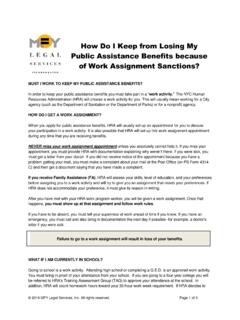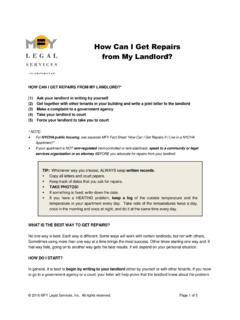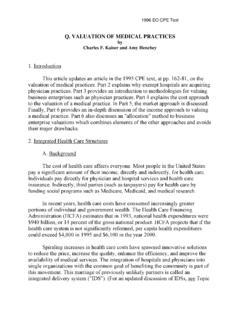Transcription of I am being sued on a medical debt—what should I do?
1 I am being sued on a medical debt what should I do? Have you received a summons from court about a medical debt ? If so, you must answer the summons within a certain amount of time or the company suing you may obtain a default judgment against you. To answer, you should go to the pro se (self represented) office in the courthouse where the case was filed and fill out a pro se answer form. Do not forget that the plaintiff has the burden of proof! This means that the medical provider or company suing you has to prove that you owe the debt . But even if the plaintiff has evidence that you owe the debt , you may still have valid defenses. The following are some defenses that may be raised in your answer to a medical debt lawsuit: General Denial: Don't assume that the information in the Complaint is correct. You have the right to generally deny the allegations in the Complaint when you are not certain that all the information is true.
2 Improper Service: The case may be dismissed without prejudice (which means that it can be re-filed) if you never received the court papers or you received them improperly. The process server must make several attempts to give them to you, or to someone at your home or office, in person, before posting them on your door. Only mailing the Summons and Complaint to you is improper! Get the process server's Affidavit of Service from the court clerk's office and examine it for accuracy. Lack of Notice: The hospital or health care provider must send you a bill or other notice that you owe money. If they never did, they cannot sue you for the money. Suing for the Wrong Amount: You have the right to challenge the amount claimed unless you are absolutely certain that the plaintiff properly calculated it, down to the penny, including all interest, collection costs and attorney's fees.
3 Illegal Acceleration Clause: The medical provider cannot charge you the full amount of the service because you missed an installment payment. This is called acceleration and it is illegal, even if you agreed to it. Insurance: If you have insurance that covers the service, the medical provider must charge the insurance company first. If you had Medicaid at the time of the service: o a Medicaid provider cannot sue you. o a non-Medicaid provider cannot sue you unless it gave prior notice in writing that it does not accept Medicaid and that you would have to pay out of pocket. If you did not have Medicaid but were eligible, a hospital has a duty to help you file an application and inform you if the application was denied. If you did not have insurance that fully covered the service, a hospital is required to notify you about, and provide financial assistance.
4 Statute of Limitations: The plaintiff must file the lawsuit within 6 years from the date of the default. The date of the default is the date that your first missed payment was due. This 6-year clock will start to run again if you make any future payments, so be very careful when trying to settle or pay off a defaulted debt . After the statute of limitations has run, you can get a case dismissed. MFY Legal Services, Inc. 2013. All rights reserved. 1. Bankruptcy: If you filed for bankruptcy and the debt was discharged, you do not owe the money. Duress: This defense applies if you were pressured into agreeing to payment terms when you were so sick or in so much pain that you had no free will. Unconscionability: Use this defense when the agreement was shockingly unfair and very one-sided in favor of the medical provider. Law of Necessaries: Were you sued for someone else's medical debt ?
5 You may only be responsible if all of the following is true: The other person is your spouse or child;. The services provided were necessary for the other person's health or survival;. The medical provider gave the service on the condition that you would be financially responsible;. The other person is financially unable to pay the debt out of his or her own resources; AND. You are able to pay the debt out of your own resources. debt buyers: If another company bought your debt from the medical provider and has sued you, you may have additional defenses: Standing: The debt buyer plaintiff must prove that it owns your debt and, therefore, is allowed to sue you (or has standing to sue you). Put the plaintiff to its proof and demand to see the contract of sale (or assignment ). Licensing: All debt buyers must be licensed by the NYC Department of Consumer Affairs.
6 To find out, call 311 or check If the plaintiff is not licensed, the court can dismiss the case. If the plaintiff is licensed, it must list its license number on the complaint. Exempt Income: Although not a defense, you may want to inform the plaintiff and the court of your source of income if it is exempt from collection. The following sources of income cannot be taken to pay a judgment: 1. Supplemental Security Income, (SSI). 2. Social Security 3. Public Assistance (welfare). 4. Spousal Support, maintenance (alimony) or child support;. 5. Unemployment benefits 6. Disability benefits 7. Workers Compensation benefits 8. Public or private pensions 9. Veterans benefits 10. 90 percent of your salary or wages earned in the last 60 days 11. Railroad retirement 12. Black lung benefits For more information, visit the New York City Civil Court Website: or visit MFY Legal Services, Inc.
7 2013. All rights reserved. 2.













